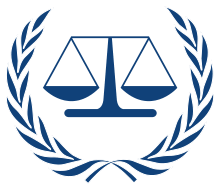Völkerstrafgesetzbuch
The Völkerstrafgesetzbuch (German: [ˈfœlkɐˌʃtʁaːfɡəˌzɛtsbuːx], "Code of Crimes against International Law"), abbreviated VStGB, is a German law that regulates crimes against (public) international law. It allows cases to be brought against suspects under international criminal law provisions, meaning that suspects can be prosecuted even though both they and their victims are foreigners and the crime itself took place abroad.[1]
The VStGB was created to bring the German criminal law into accordance with the Rome Statute of the International Criminal Court. It was announced on 26 June 2002 and became law 30 June 2002.
Contents
The VStGB covers the following offenses:
- Genocide (§ 6)
- Crimes against humanity (§ 7)
- War crimes (§§ 8–12)
None of these are subject to a statute of limitations (§ 5). The general principles of criminal law under the Strafgesetzbuch (German penal code) remain applicable, unless otherwise provided (§ 2). As a novelty under German criminal law, provisions on superior responsibility are established (§§ 4, 13, 14). Acting upon superior orders may only exculpate a perpetrator of international crimes in exceptional circumstances (§ 3).
According to § 1, genocide, crimes against humanity, and war crimes are subject to universal jurisdiction, thus German courts can punish offenses committed by foreign citizens abroad. Prosecutorial jurisdiction lies with the Public Prosecutor General. Competent courts at first instance are the Oberlandesgerichte (Higher Regional Courts). The prosecution of crimes committed outside German jurisdiction is limited by § 153f of the German Criminal Procedural Code, which gives the Public Prosecutor General a wide discretion of when to open a case via universal jurisdiction, if the offender is not of German nationality. So far the Public Prosecutor General's office has suspended persecator measures for 128 cases brought to its attention involving international crimes pursuant to the German International Criminal Code.
Notable cases
In May 2011, the trial of two Rwandan citizens, Ignace Murwanashyaka and Straton Musoni, began before the Higher Regional Court in Stuttgart. This was the first trial under the VStGB in Germany.[2][3] Prosecutors had pushed for a life sentence for Murwanashyaka with no conditional release after 15 years and 12 years in prison for Musoni.[4] In September 2015, the accused were eventually sentenced to 13 and 8 years in prison.[5]
In 2017, the Higher Regional Court in Stuttgart found a 24-year-old Syrian national guilty under the VStGB of being an accessory to a war crime against the United Nations Disengagement Observer Force (UNDOF) that involved kidnapping of Canadian peacekeeper Carl Campeau for ransom, three counts of attempted robbery by blackmail and grievous unlawful detention.[6][7]
In February 2020, an Iraqi man who allegedly left a 5-year-old Yazidi girl he and his wife kept as a slave in Iraq to die of thirst in the heat was indicted at the Higher Regional Court in Frankfurt on charges of murder, membership of a foreign terrorist organization, genocide, crimes against humanity, war crimes and human trafficking.[8][9]
In April 2020, proceedings were launched at the Higher Regional Court in Koblenz against Anwar Raslan and Eyad al-Gharib, two suspected members of President Bashar al-Assad’s security services, on charges of crimes against humanity, rape, aggravated sexual assault and murder, making them the first trial for war crimes by Syrian government agents.[10][11][12][13]
References
- Tobias Buck (October 29, 2019), Germany charges two Syrians with crimes against humanity Financial Times.
- "Rwanda: Ignace Murwanashyaka and Straton Musoni tried". BBC. 4 May 2011. Retrieved 5 May 2011.
- "Oberlandesgericht Stuttgart (5. Strafsenat) eröffnet Hauptverfahren gegen zwei mutmaßliche Führungsfunktionäre der "Forces Démocratiques de Libération du Rwanda" (FDLR )". Oberlandesgericht Stuttgart (in German). 4 March 2011. Archived from the original on 23 August 2011. Retrieved 5 May 2011.
- Germany finds Rwandan rebel leaders guilty of war crimes Deutsche Welle, September 28, 2015.
- "Conviction of FDLR leaders by German Court". Armed Groups and International Law. 28 September 2015. Retrieved 1 October 2015.
- Justin Huggler (January 22, 2016), Suspected Syrian jihadist arrested in Germany for 'war crime' The Daily Telegraph.
- Joseph Nasr (September 20, 2017), German court finds Syrian guilty over U.N. peacekeeper abduction Reuters.
- Germany indicts Iraqi man over death of Yazidi slave girl Associated Press, February 21, 2020.
- Higher Regional Court Frankfurt/Main: beginning of the main trial against Taha Al-J. Higher Regional Court Frankfurt/Main, press release of April 24, 2020.
- Tobias Buck (October 29, 2019), Germany charges two Syrians with crimes against humanity Financial Times.
- Philip Oltermann and Emma Graham-Harrison (April 22, 2020), Two Syrian defectors to go on trial in Germany for war crimes The Guardian.
- Petra Wischgoll (April 23, 2020), German court opens first Syria torture trial Reuters.
- Loveday Morris (April 23, 2020), German court case is first to try Syrian regime for war crimes Washington Post.
External links
- Full text of the Völkerstrafgesetzbuch (in German, official text)
- Full text of the Völkerstrafgesetzbuch (in English, unofficial translation)
- Translations of the Völkerstrafgesetzbuch (Arabic, Chinese, English, French, Greek, Portuguese, Russian, Spanish; translated by the Max Planck Institute for Foreign and International Criminal Law)
- Section 153f of the German Criminal Procedural Code (in English)
- Rome Statute of the International Criminal Court
